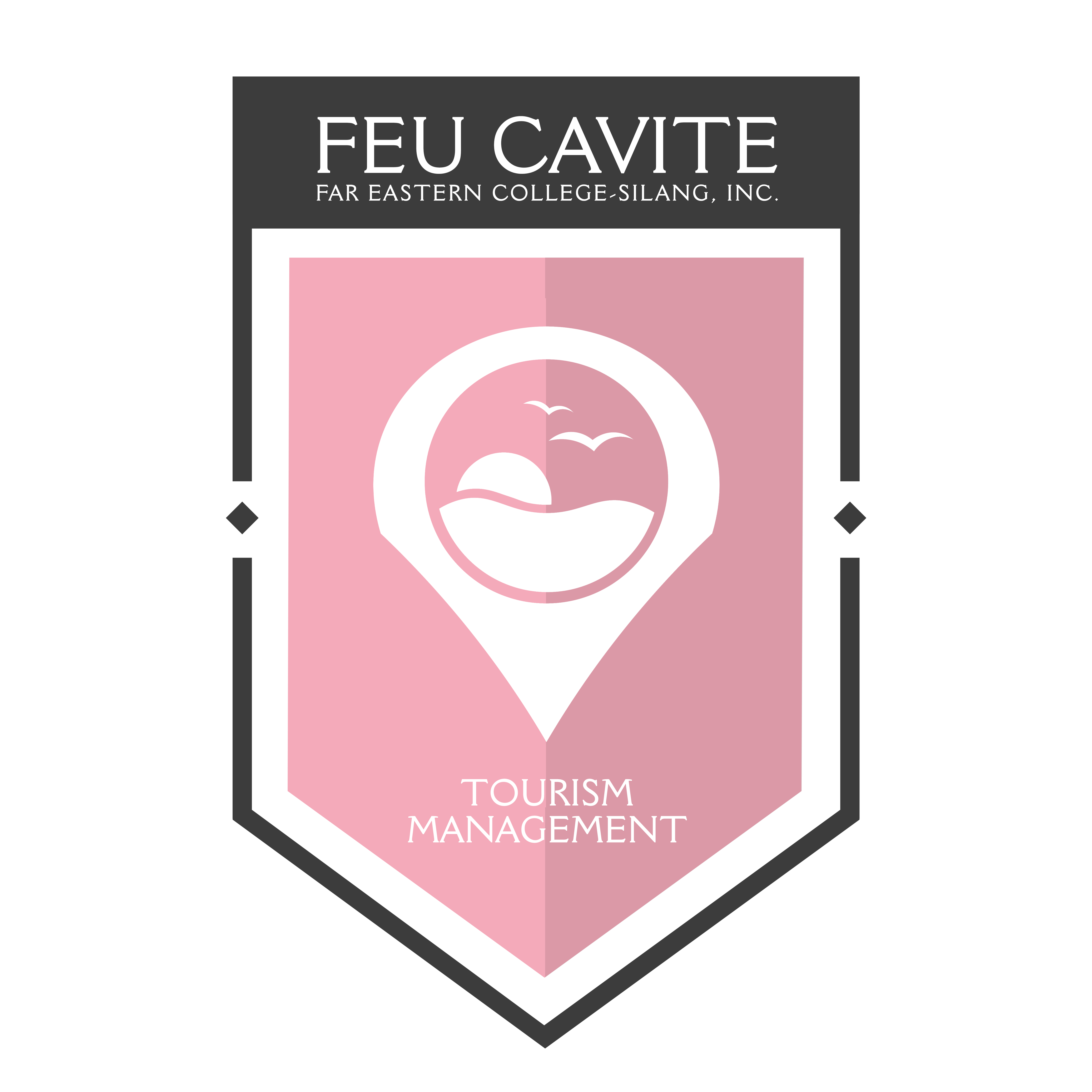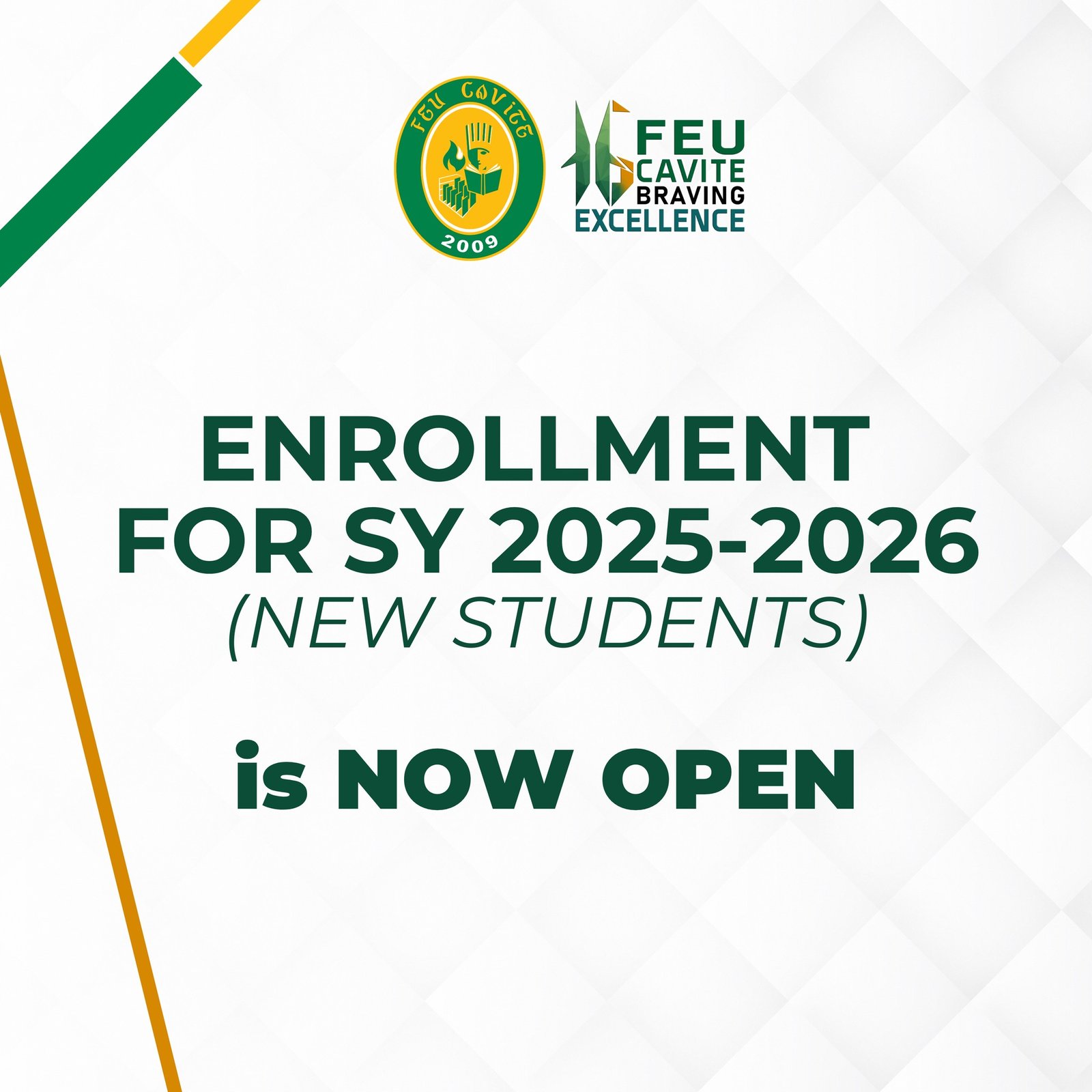Department of Tourism Management

Program Offerings:
- Bachelor of Science in Tourism Management (Travel and Tours Management Track)
- Bachelor of Science in Tourism Management (Events Management Track)
Ms. Grace B. Gison, MSTM
Department Chair
Office Location
Department Chair’s Office, Basement of HED Building
Contact Number
TEL: (046) 419 8500 loc. 216
E-mail
ggison@feucavite.edu.ph
The current Bachelor of Science in Tourism Management (BSTM) program is a four-year degree program with two tracks, namely Event Management and Travel and Tours Management. It prepares students for management positions in some of the largest and fastest-growing economic sectors worldwide in the tourism industry.
In this program, students acquire essential industry knowledge and leadership skills in hospitality finance and development, marketing and revenue management, conference and special event planning, tourism destination policy and promotion, and food and beverage operations, both in and out of the classroom. They gain hands-on experience through internships and events while building a valuable portfolio of professional experience and an extensive network within the industry even before they graduate, ahead of their peers. With creativity and entrepreneurship as their leverage, students are prepared to push the boundaries of this growing global industry.
1. TRAVEL AND TOURS MANAGEMENT TRACK – The rack entails theories and practices in managing a wide range of travel-related tasks, including researching the tour destination, organizing the trip, arranging transportation, and providing accommodations. Students are also introduced to marketing strategies and tourism-related activities that are utilized to promote domestic and international travel to popular tourist destinations.
2. EVENTS MANAGEMENT TRACK – The Event Management track gives students the chance to learn more about and get ready for careers in fields like festivals, trade exhibitions, meetings/conventions, business and marketing events, and social events. The curriculum is primarily directed to students with specific interest in a profession as a corporate or freelance event planner.
The program welcomes all interested students from any senior high school track provided they reach the required minimum score in the FEU College Admission Test (FEUCAT). All incoming first year students must adhere to the University’s admission requirements as prescribed by the Admission and Financial Assistance Office.

Program Objectives
In accordance with FEU’s mission and vision, the BS Tourism Management Program responds to the high standards of the Tourism industry by providing the best professionals in the field. It aspires to produce graduates who shall take on the leadership and innovative roles in the rapidly changing global tourism environment while embodying the FEU’s core values of fortitude, excellence, and uprightness.
Students are trained and exposed to highly-competitive environment that includes sectors from include travel agency and tour operations, hotels, global distribution system, transportation (air, land and water) and airport support companies.
BSTM also adheres with the prescribed objectives for tourism management education, as indicated in the Commission on Higher Education (CHED) memorandum order (CMO) no. 62, series of 2017.
Program Expected Learning Outcomes
Common to all programs
Graduates of FEU can:
- Articulate and discuss the latest developments in the specific field of practice;
- Effectively communicate orally and in writing using English, Filipino, mother tongue language, and an appropriate Foreign Language required by the industry;
- Work effectively and independently in multi-disciplinary and multi-cultural teams; and
- Act in recognition of professional, social, and ethical responsibility
- Preserve and promote “Filipino historical and cultural heritage” (based on RA No. 7722)
Common to tourism and hospitality disciplines:
Graduates of the Institute of Tourism and Hotel Management (ITHM) can:
- Demonstrate knowledge of tourism industry, local tourism products and services;
- Interpret and apply relevant laws related to tourism industry
- Observe and perform risk mitigation activities;
- Utilize information technology applications for tourism and hospitality;
- Manage and market a service-oriented business organization;
- Demonstrate administrative and managerial skills in a service-oriented business organization;
- Prepare and monitor industry specific financial transactions and reports;
- Perform human capital development functions of a tourism oriented organization; and
- Utilize various communication channels proficiently in with guests and colleagues
Specific to the BSTM program
BS Tourism Management graduates can:
A graduate of BS Tourism Management should be able to but not limited to:
- Develop and execute strategic management initiatives and activities for travel and tours, integrating heritage, cultural, and geographical factors to enhance the overall experience and promote sustainable tourism.
- Design and execute various tour guiding management and operational related programs and activities.
- Formulate and implement research, marketing strategies, innovative travel and tours services and utilize cutting-edge technology in tourism operations.
- Formulate and execute sustainable development strategies for management and operational excellence.
- Analyze and synthesize strategies for optimizing tourism attractions and site management towards visitors ‘satisfaction through the design, execution, and assessment of programs and activities.
- Critically plan, evaluate and implement long term sustainable practices, considering the economic, social and environmental impact.
- Design and orchestrate comprehensive Meetings, Incentives, Conferences and Exhibitions (MICE) events with a focus on best practices of sustainability, innovation and strategic impact.
Career Pathways
The BSTM program offers diverse career options for its graduates. The following are some industries and positions for which they can apply:
Transportation sector
- Airlines: Cabin crew, Ground attendant, Sales and Marketing Manager, Passenger Service Representative, Reservations and Ticketing Officer, Training Manager
- Sea: Cruise Line Director, Documentation Officer/ Supervisor, Chief Steward/Stewardess, Reservations Officer, Booking Supervisor, Training Manager
- Land: Reservations Officer, Reservations Manager, Sales and Marketing Manager, Operations Manager
Travel agency / tour operation sector
- Tour Guide, Travel Agency Manager/ Agent, Reservations and Ticketing Manager, Documentations Department Manager, Leisure Product Developer, Front Desk Officer, Tourism Information Assistant, Marketing Officer, Liaison Officer
Hotel Sector
- Accounts Executive, Banquet Manager, Events Planner, Front Office Staff, Sales Representative, Marketing Officer, Hotel Representative, Researcher and Developer, Training Manager
Meetings, Incentives, Conventions and Events
- Events Manager, Events Coordinator, Events Host, Events Stylist, Product Developer
Public / civil service
- Planner, Developer, Researcher, Marketing Officer, Project Development Specialist, Liaison Officer, Tourism Diplomat, Training Officer
Academe
- Lecturer, Researcher, Training Consultancy
Program Features
The BSTM program uses varied approaches in tourism management education, adapting to the needs of our students and the demands of the changing global work environment in the tourism profession. This allows the program to stay competitive and relevant in the field.
Program Curriculum
General Education (GE) courses comprise most of the required units during the first two years of the program. These are university-wide courses intended to develop the students’ key academic skills and competencies such as persuasive communication and innovative thinking. The University upholds that developing such basic competencies helps prepare students towards becoming independent learners as they progress in their respective programs and eventually, their careers.
Alongside their GE courses, BSTM students must also undertake professional tourism courses depending on their chosen track.
Event Management Track
The BSTM – Event Management Track aims to produce graduates who are equipped to professionally handle different types of meetings and events in diverse settings. Business and technical skills in event management such as event project planning and implementation, financial management, facilities management, event program design, and the like are honed through case study analyses, event proposal creation, presentations, and actual handling of several events.
Professional skills such as conscientiousness, leadership, teamwork, and time management are also developed through theory and practice. Graduates of this track may venture into event management-related businesses, event consulting, and work in tourism, hospitality, and corporate fields where specialized skills in event management are required.
Travel and Tours Management Track
Meanwhile, the Travel and Tours Management Track aims to produce graduates with comprehensive knowledge in the management, operations, and service delivery of the different sectors of the tours and travel industry.
The professional, business, and travel-related skills are developed to prepare students to take entry-level, supervisory, and even entrepreneurial positions in tour and travel operations and related fields in multi-cultural settings.
On top of the knowledge and competencies focused on travel agency management, tour marketing and promotions, tourism laws, domestic and international tourism operations, specialized skills in recreation and leisure, destination management, and heritage tourism are also developed.
Afterward, students are required to perform internal auditing research works and feasibility studies and undertake 600-hour supervised apprenticeship training in various auditing and accounting firms and other accredited business firms.
Students are also trained to become well-rounded, socially and morally responsible citizens through the National Service Training Program (NSTP) and the Wellness and Recreation Program (WRP) of the University. Under WRP, students can choose to attend a diverse array of short courses intended to develop their physiological and emotional well-being as well as their sense of belonging in the community and their social responsibility.
Teaching-Learning Approaches
The BSTM program utilizes multiple teaching-learning approaches catering to students’ needs and empowering them as independent learners and outstanding tourism management professionals in the future. These approaches include:
Student-centered learning
Following the University’s educational philosophy and learning paradigm, the BSTM program utilizes methods which encourage active and collaborative learning engagements between the students and the teachers. Through dynamic activities and tasks, students are empowered to take responsibility for their own learning rather than become passive recipients of information in the classroom.
Didactic approach
Fundamental knowledge in management concepts, principles, and laws are taught through a mix of discussions and lectures.
Interdisciplinary approach
The BSTM program equips students with the ability to see the various aspects of professional tourism management practice through multidisciplinary lenses and perspectives. This, together with their liberal GE courses in the field of arts, humanities and social sciences, encourage well-rounded development for our students.
Blended learning
BSTM facilitates ubiquitous learning in its courses through online virtual classrooms, online modules and web resources. The program primarily uses Canvas, the official learning management system (LMS) of FEU and a globally recognized platform among leading educational institutions worldwide.
Research-based approach
Students are encouraged to conduct research work, while professional courses also utilize research-based materials such as case studies and feasibility studies to ensure the delivery of updated information about current industry standards and practices.
Assessment and Research Work
Tourism Management is a skills-based program designed to develop and hone the students’ capabilities through the assessment of their critical thinking, communication, customer service and other related skills that are essential in the tourism and hospitality industry.
Aside from the traditional pen and paper assessments, BSTM students prepare and deliver presentations on current issues and specific topics about tourism. Before the end of each semester, students are expected to apply these skills in their respective actual culminating activities (ex. Handling local and international events).
Research is part of the students’ coursework in most of their professional courses like tourism impacts and sustainability, ecotourism, entrepreneurship, among others. Their topics must be aligned with the tourism agenda of the United Nations World Tourism Organization (UNWTO).
Internship
Tourism students are expected to finish 600 hours of internship in reputable tourism-related companies, both private and government, such as airlines, airports, travel agencies, hotels, casinos, recreational facilities, among others.

